KEY HIGHLIGHTS
- The 160 Duke competes against the Apache RTR 160 4V, Yamaha MT-15 V2, Bajaj Pulsar N160, Hero Xtreme 160 R 4V and the Honda Hornet 2.0.
- In terms of numbers, the 160 Duke outclasses a lot of its competition.
- The MT-15 V2 is one of the only two in its segment to get a TFT screen.
- The Pulsar N160 is the heaviest in this segment.
The KTM 160 Duke is the newest entrant in the 160cc segment, and this makes the competition in the segment even more heated. With various other players in this segment, the KTM may seem like a late comer. However, this is a way for Team Orange to make itself more accessible to a larger audience, especially given the 125 Duke that did not seem to work.
For the sake of this comparison, we will see how the KTM fares against the Bajaj Pulsar N160, the TVS Apache RTR 160 4V, and the Yamaha MT-15 V2. However, before diving into the details, make sure to join the 91wheels WhatsApp Community to keep up with the latest news and updates from the automotive community.
Also read: Twin-Cylinder KTM Duke And Adventure Test Mules Spotted; Is The 490 Project Coming Back?
KTM 160 Duke Vs Rivals: Design

All motorcycles in this comparison are fairly recognisable and follow a similar pattern here. Having been around for a long time, these motorcycles are also quite recognisable, the Apache RTR 160 4V and the MT-15 V2 in particular. The Pulsar N160 did seem to resemble the MT-15 initially from the front, but it has since then found its own character, lookng especially purposeful in its darker paint schemes.
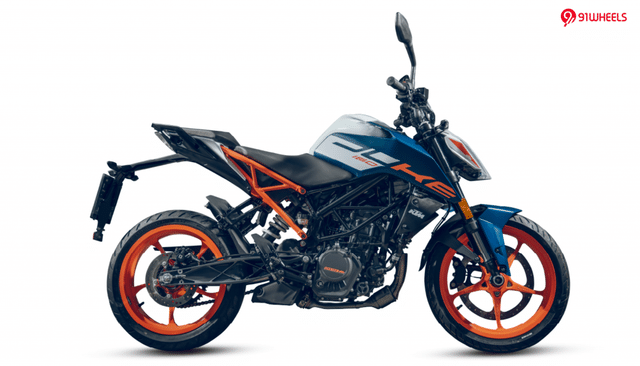
The 160 Duke, despite being the newcomer is at a slight disadvantage, as it continues to use the design of the older series Duke, which the 200 Duke also does. While still sporty and sharp, this design has become a quite dated, having been in use for many years now. However, the alloy rims are the same ones as seen on the 390 Duke and the RC390.
That said, this is a rather subjective round, and it all boils down to user preferences. However, it is safe to say that all motorcycles here come with sharp bodywork and a compact but muscular-looking design.
KTM 160 Duke Vs Rivals: Powertrain
| Parameter | KTM 160 Duke | Bajaj Pulsar N160 | Yamaha MT-15 V2 | TVS Apache RTR 160 4V |
| Engine | 164.2cc, liquid-cooled, single-cylinder | 164.8cc, air-cooled, single-cylinder | 155cc, liquid-cooled, single-cylinder | 159.7cc, oil-cooled, single-cylinder |
| Power | 18.7bhp at 9500rpm | 15.6bhp at 8750rpm | 18.1bhp at 10,000rpm | 17.3bhp at 9250rpm |
| Torque | 15.5Nm at 7500rpm | 14.65Nm at 6750rpm | 14.1Nm at 7500rpm | 14.73Nm at 7500rpm |
| Gearbox | 6-speed gearbox | 5-speed gearbox | 6-speed gearbox | 5-speed gearbox |
| Riding Modes | NA | NA | NA | Three |
From a numbers point of view, it is pretty clear that the KTM 160 Duke has an edge over the other three bikes in the comparison. Given that it is a KTM, we can expect the 160 Duke to have the familiar manic acceleration Dukes are generally known for, but within the limitations of the average rider in this particular segment.
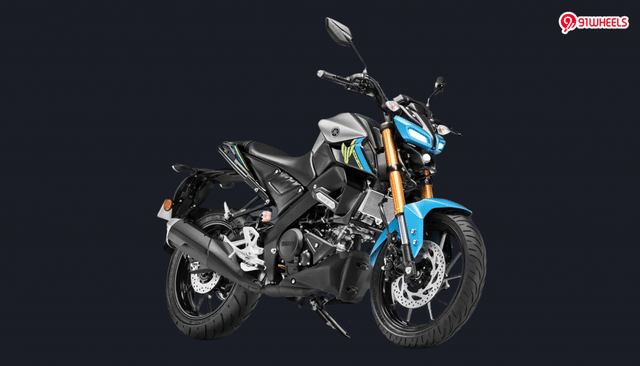
The MT-15 V2 borrows its powertrain from the R15, but with certain alterations to make it easier to ride. With the OBD-2B version yet to be tested, we can expect the same kind of refinement that we are used to seeing from Yamaha powertrains. The BS6 version is also quite tractable for city conditions, but at the same time, it has a tendency to sound strained when you wring the throttle hard or when on the highway. That said, it is possible to expect something different from the OBD-2B variant.

The Apache RTR 160 4V was once the king of this segment, but it still has a hidden trick up its sleeve; three ride modes. With Sport, Urban and Rain modes on offer, the Apache RTR 160 4V allows you to customize its character to suit your tastes. That said, Sport mode is where you should really stick to, since the other modes dull things down considerably.

The Pulsar N160 may have the smallest numbers on paper, but it feels quite refined throughout the rev range. It is quite tractable and even in fifth gear, it trundles around at lower speeds without feeling stressed. It also packs in enough gusto for the highway, with decent mid-range performance. That said, a real-world comparison shall tell us how differently it performs against the competition.
KTM 160 Duke Vs Rivals: Hardware
| Parameter | KTM 160 Duke | Bajaj Pulsar N160 | Yamaha MT-15 V2 | TVS Apache RTR 160 4V |
| Frame | Split-steel trellis frame | Tubular frame | Deltabox | Double cradle split synchro |
| Front Suspension | 43mm WP USD forks | 37mm USD forks | 37mm USD forks | 37mm USD forks |
| Rear Suspension | Pre-load adjustable WP monoshock | Monoshock | Monoshock | Monoshock |
| Front Brake | 320mm disc with a four-piston calliper | 300mm disc | 282mm disc | 270mm petal disc |
| Rear Brake | 230mm disc with a two-piston calliper | 230mm disc | 220mm disc | 240mm petal disc |
| Kerb Weight | 147kg | 147-152kg | 141kg | 143-146kg |
| Fuel Tank | 10.1 litres | 14 litres | 10 litres | 12 litres |
All four motorcycles come are built on different setups and receive various kinds of hardware. The 160 Duke, of course, comes with the most premium WP Apex hardware here, and it also gets the largest disc brakes in this comparison. It remains to be seen how the 160 Duke rides over good and bad roads, but we can it expect to be the among the best in terms of riding dynamics.
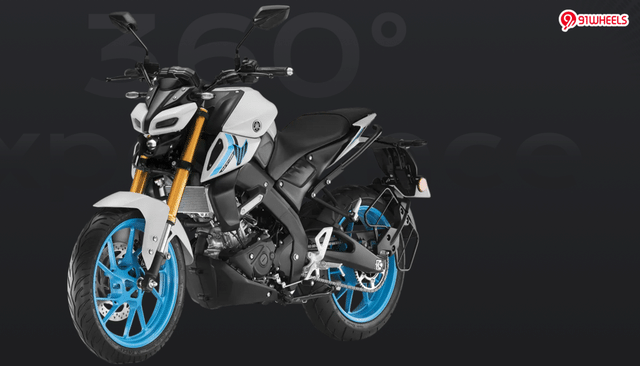
The MT-15 V2 is the lightest in this comparison, and that should make it fairly nimble and agile. With its compact dimensions and its chassis derived from the R15, the MT-15 feels quite planted when leaned over, allowing you to stick to a line and carry decent speeds. However, the ride quality is on the stiffer side, and you will end up wishing for a more pliant setup over bad patches.

The Pulsar N160 and the Apache RTR 160 4V both have a tendency to feel front-heavy. However, there are some interesting things to point out here. The Apache's footpegs are placed quite high-up, which will make things uncomfortable for taller riders in a surprisingly short amount of time. That said, the Apache's suspension feels better balanced, but the Pulsar isn't bad on this regard either, even though it does feel more firmly setup.

The Apache also offers a more upright position and a wider handlebar, while the Pulsar seats you slightly lower and more leaned-forward. The wider setup of the Apache offers better leverage, and there is something very natural about taking corners with this bike, as it tips in beautifully.
KTM 160 Duke Vs Rivals: Features
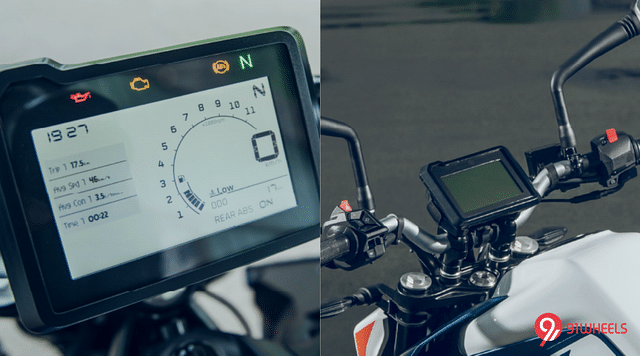
In terms of features, the 160 Duke gets a simpler LCD screen setup instead of the TFT unit from the 390 and the 200 Duke, which makes sense considering this is the entry-level offering in the Duke lineup. However, even then, the motorcycle seems pretty well kitted out in terms of features. Some other standard features offered on the KTM 160 Duke include bluetooth connectivity, turn-by-turn navigation, alerts for calls and SMS, and music streaming abilities. Additionally, it also comes with switchable dual-channel ABS and a gear position indicator as well.

The Pulsar N160 is available in three different variants; USD, dual-channel ABS, and twin-disc. All variants get the same negative-lit LCD instrument cluster with bluetooth connectivity, but the twin-disc and dual-channel ABS variants come with call and SMS alerts, a gear position indicator, USB charging port, fuel economy readout and phone network display. The USD forks variant adds on turn-by-turn navigation and three ABS modes.

The Apache RTR 160 4V has always been equipped with a good set of features, receiving an LCD screen with bluetooth connectivity, turn-by-turn navigation, dual-channel ABS with lift-off protection, three ride modes, adjustable levers, racing stats, voice assist, and a lean-angle sensor.
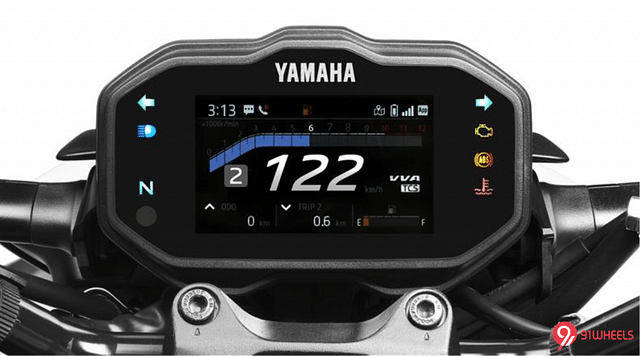
The MT-15 V2 recently got an update which gave it a TFT instrument cluster, making it the second only motorcycle in this segment after the Honda Hornet 2.0 to get it. The MT-15 V2 also gets bluetooth connectivity, turn-by-turn navigation, call/SMS/email alerts, fuel readout, phone battery alert, a slip-and-assist clutch, dual-channel ABS. and traction control. Additionally, it also comes with app-based features, such as a vehicle finder and rider stats.
Verdict
The Pulsar N160 is easily the most affordable in this comparison, with prices ranging between Rs 1.22 lakh to Rs 1.36 lakh. It feels quite well put-together and feels quite friendly in daily city conditions.
With prices ranging between Rs 1.25 lakh to Rs 1.39 lakh, the Apache RTR 160 4V emerges as a very strong frontrunner in this comparison. There are multiple variants on offer, and it gets a good set of features as well. Not to forget it is a genuinely enjoyable motorcycle to ride.
The Yamaha MT-15 V2 and the KTM 160 Duke lean more towards the premium end of things, and on paper, it seems as if the KTM has the upper hand here, considering all the premium hardware it offers, along with the performance numbers and additional features on offer as well. However, the 160 Duke will show us its real colours soon enough, which should help making things more clearer.
Do you like this article?
Comments
No comments yet. Be the first to comment!













